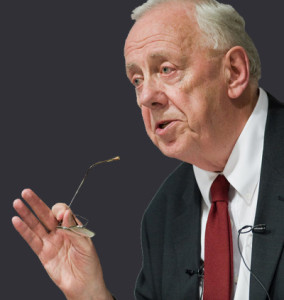Christians are called to conversion, to become different kinds of persons, a different kind of community. The liturgy is the place where we learn what sort of persons we are to be. I’ve given a number of theological reasons for this in recent weeks. I’d like now to turn to some other considerations.
First of all, what are we being converted from? The typical answer would be, “Sin.” And this is correct. But there is actually something more, something subtler that the gospel reveals. Baptism was frequently referred to in the early church as “Enlightenment.” So not only did baptism bring forgiveness of sins and sanctifying grace, but it brought about a change of thinking, a revelation, light and clarity where there had been darkness and obscurity, sight where there had been blindness.
The typical blind person in the gospels is, revealingly, the Pharisee. The Pharisees, it should be noted, were generally held to be models of virtue by the Jews of the day, and with good reason. They followed the Torah, kept ritually clean, tithed, looked after the poor, and all the rest. And yet, the Lord refers to more than one of them as blind. From this we can see that “sin”–understood as transgressions of specific laws–is not sufficient as an explanation of the worldview that we are meant to turn away from.
Saint Paul exemplifies this situation. He says in his own words that by the standards of the law, his younger self–a Pharisee–was blameless. What changed? We are apt to say something like, “He realized that he needed to be saved by faith instead of the law.” Now this gets us closer. But recall the question we are asking: from what sort of life are we being converted? This can’t be a rejection of the law, since those who do not keep it and prevent others from keeping it are least in the kingdom.
In Chapter 7 of Paul’s letter to the Romans, Paul makes some suggestive (though difficult) remarks. He writes about “sinful passions.” This word “passion” comes to play a big part in monastic spirituality and later throughout the Church (though with somewhat less emphasis). Passions are not the same as feelings. Simple movements of emotion are a natural part of our bodily structure. A feeling becomes a passion when we distort it by liking it beyond reasonable measure, seeking it out, treasuring it, allowing it to bend our minds. This is the source of blinding. When we are under the spell of a passion, we no longer think straight. We all know this in some obvious cases. All one has to do is listen to talk radio or read internet comment threads to discover that anger renders people narrow and illogical. We all have known persons (perhaps ourselves) who, enticed by an attractive person, leave all caution and good sense to the wind.
The law itself can have this effect. Paul was so good at the law that he took pride in fulfilling its prescriptions, and this pride became a debilitating passion in him. So much so that he failed to see that he was acting against God when he was persecuting the early Christian sect. A wiser Pharisee, Paul’s own teacher Gamaliel showed better sense when he urged that Sanhedrin to leave the Christians alone, lest they “even be found opposing God [see Acts 5: 33-40].” Young Saul thought he knew better than Gamaliel and even convinced the Sanhedrin to go against Gamaliel’s sound advice [see Acts 22: 3-5].
Now to our peculiar danger: according to Alasdair MacIntyre, our Western culture is an emotivist culture, and has been for some time. What is emotivism? I will use one of the next posts to give a fuller answer to that question, but here’s an attempt at a short answer. An emotivist is not as interested in truth as he or she is in effectiveness. And to oversimplify more, an emotivist wants to put in effect whatever he or she feels to be good. If MacIntyre is correct, we have wandered into an institutionalized blindness, for we have placed the passions in the driver’s seat, unaware that our arguments are not rational (an emotivist only pretends to be rational because an argument that appears to be rational is more effective than one that is naked nonsense).
If the above is true, our conversion today needs to be away from emotivism toward genuine Truth and virtue. This is the spiritual analog to the argument put forward by MacIntyre over thirty years ago in After Virtue. It is worth noting that the traditional spiritual triad of the purgative, illuminative and unitive ways begin with the healing of behavior (purgative) and then of the mind (illuminative). For reasons that I hope to show in my coming post on emotivism, the problem with emotivism is precisely that it disposes us to willfulness and blindness, the opponents of virtue and truth. This can be true even when we have the outward appearance of a devout life of prayer and service. Emotivism hampers our ability to present the gospel to others, since it disposes us to hear the gospel in terms of effectiveness (and effectiveness in terms of realizing personal desire, not effectively achieving actual justice or compassion), rather than in terms of truth.
There is a lot to unpack here. Please send any questions you have to me, and I will try to clarify anything that you are having difficulty understanding. I will try to go slowly, as this is an important topic and worth the time it takes to master it.

